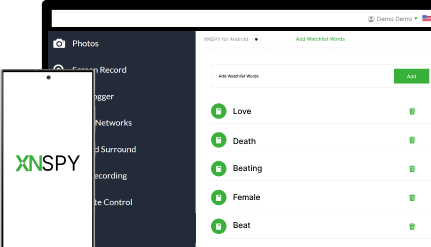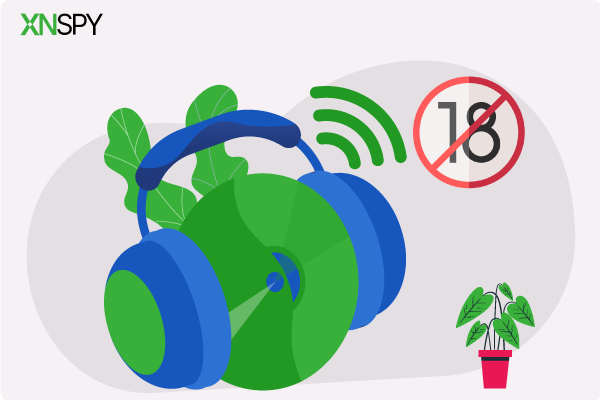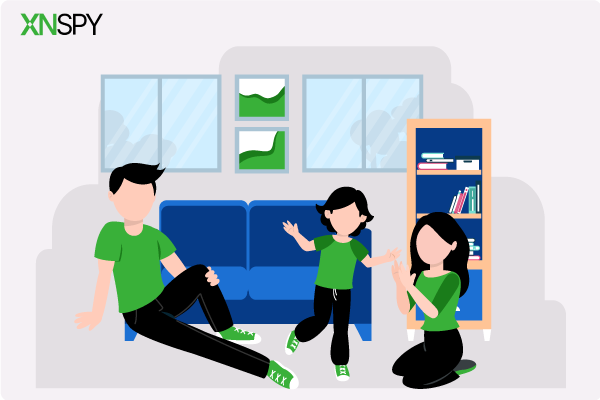The complete monitoring experience for your phone
Get XNSPY and start tracking calls, texts, multimedia, locations and more on any phone!
Get Started Now Live DemoIf you are a parent, you have probably noticed your teen speaking in a language that might as well be from another planet. As teens come up with new ways to express themselves, it can feel like trying to decode a secret code. But here’s the thing – knowing what your new generation kids are saying is one of the best ways to keep them safe.
With new emojis and slang popping up all the time, staying in the loop is key to understanding what they are really talking about. Whether it is keeping track of trends, preventing risky behavior, or just staying connected, knowing the latest teen lingo gives you a bit of an edge.
So let’s dive into the most current slang for 2026 – 150+ terms that you need to know to stay in touch with your teen and keep them safe online and offline.
Modern Teen Slang Categorized as per Situations
Did you know that slang was originally used by thieves and criminals as a form of secret code? Nowadays, teen slang terms have evolved to carry both positive and negative meanings. However, because these words often lack a clear, fixed definition, it can be tricky to determine whether they’re being used in a good or bad context.
To make it easier to understand their meaning, I’ve categorized new teen slang 2026 based on context so you can better grasp how they’re being used.
Teen Slang 2026 For Agreement or Disagreement / Insults or Criticism
- Fr – Short for “for real,” meaning “I agree” or “seriously.”
- Facts – Another way of saying “true” or “I agree.”
- Say less – Means “I understand” or “I get it.” It’s used to indicate agreement without needing further explanation.
- Cap – Means “lie” or “that’s false.”
- Nah, fr – An emphatic way of disagreeing, meaning “No, for real” or “Seriously, no.”.
- L – Short for “loss” or “loser.” It’s used to criticize or mock someone’s failure.
- NPC – Refers to someone who seems bland or “non-playable,” like background characters in video games. It’s a criticism of someone acting without personality.
- Mid – Means average or mediocre, often used as criticism for someone or something unimpressive.
- Dusty – Used to insult someone for being out of style or unattractive, implying they look old or uncared for.
- Skull emoji 💀 – While not a word, it’s used to indicate something is so ridiculous it’s “killing” the person with laughter or disbelief. Used in both criticism and mockery.
- It’s giving… – A phrase used to describe the vibe or energy of something, often awkwardly or negatively.
- Ick or Ick Factor – A sudden disgust toward someone you once liked.
- Skibidi – A versatile adjective that can mean anything from “cool” to “bad.”
- Shade – Subtle or indirect criticism, often humorous.
2026 Teen Slang for Compliments and Descriptions
- Fire – something is amazing or impressive
- Goat – Acronym for “Greatest of All Time,” used to compliment someone for being the best at something.
- Buttah – Compliment for something smooth or easygoing.
- No skips – Complimenting something as flawless, usually music or an album, meaning every part is good.
- W – Short for “win,” used to describe something positive or a success
- Valid – Means someone or something is really good, true, or impressive.
- Boujee – Short for “bourgeois,” this adjective compliments something or someone as fancy or high-class.
- Aesthetic – Describes something as visually pleasing or matching a certain style.
- Main character energy – Describes someone who stands out in a positive, confident way, like the main character in a movie.
- Extra – Refers to someone who’s being over-the-top dramatically or exaggeratedly.
- Salty – Describes someone as bitter or upset about something.
- BDE – “Big dick energy,” meaning someone exudes confidence without arrogance.
- Spill the tea – To share gossip or interesting information, often leading to humorous revelations.
- Woke – Originally about social awareness, it’s also used humorously to describe someone overly politically correct.
- Demure – A trendy aesthetic referring to mindful, modest, or reserved looks.
- Sigma – Someone independent but strong, unlike the typical “alpha.”
Teen Text Slang: Social Media and Online Culture
- DM – Direct Message, used for private conversations.
- FOMO – Fear of Missing Out, often used to refer to seeing others’ activities online.
- TL – Timeline refers to someone’s feed on social media.
- FYP – For your page, the main feed on TikTok shows recommended content.
- Ratio – When a reply gets more engagement (likes, retweets) than the original post, often used as a form of online criticism.
- Clout – Refers to influence or popularity, especially on social media.
- Stan – To be an obsessive or dedicated fan of someone or something.
- Viral – When content becomes widely popular very quickly.
- POV – Point of View, often used in captions to give context to a video.
- IYKYK – If You Know, You Know, something only certain people will understand.
- Big mood – When something is super relatable, expressing how someone feels.
- Simp – A person who does too much for someone they like, often used playfully.
- IRL – In Real Life, referring to offline, non-digital life.
- TBH – To Be Honest, often used in confessional posts or comments.
- IMO / IMHO – In My Opinion / In My Humble Opinion/ In My Honest Opinion.
- SMH – Shaking My Head, used to express disappointment or disbelief.
- LMK – Let Me Know.
- IDC – I Don’t Care.
- NGL – Not Gonna Lie, used before a candid or honest statement.
- TMI – Too Much Information, used when someone shares more than needed.
- FWIW – For What It’s Worth, which is usually used to add perspective to a comment.
- ROFLMAO – Acronym of Rolling on the floor, laughing my ass off.
Current Teen Slang For Emotions and Reactions
- Vibe – Describes a good mood or feeling of connection.
- Hyped – Feeling excited or energetic.
- Lit – Used to describe something fun or exciting or feeling pumped up.
- Gassed – Feeling proud or flattered, especially after a compliment.
- On cloud nine – A phrase to describe extreme happiness.
- Sending good vibes – A way of expressing positivity or support.
- Pressed – Feeling annoyed or bothered.
- Dead – A term for feeling overwhelmed or tired, but often dramatically or humorously.
- Lowkey sad – Feeling quietly or mildly sad, often used to downplay emotions.
- In my feels – Feeling emotional, whether sad or sentimental.
- Shook – Feeling shocked or surprised, often negatively or overwhelmingly.
- Weak – A reaction to something hilarious, often used like “I’m laughing so hard.”
- Bruh – Used as a reaction to surprise, disbelief, or disappointment, and can have various tones depending on the situation.
- Sheesh – A way to express shock or awe, often in reaction to something impressive or surprising.
- Smol/Smol Beans – A play on the word ‘Small’ usually used to describe smal and cute animals.
- Cringe – A reaction to something embarrassing or awkward.
- IDK/IDEK – I Don’t Know/ I Don’t Even Know (Mostly used in teen text slang)
Teen Slang Words 2026 That Are Not Appropriate
- Smash – A euphemism for having casual sex.
- Hit it – Another way of saying to have sex.
- Netflix and chill – A phrase that initially meant watching movies together but often implies casual sexual activity.
- Getting it on – A phrase indicating that two people are being intimate.
- Smut – Sexually explicit written material.
- Hookup – A general term for engaging in casual sexual activity.
- Saucy – Refers to something that is sexually provocative or risqué.
- LMP – Stands for “like my pic” or sometimes “lick my p***y.”
- Seggs – Code for s*x
- Thot – Stands for that ho over there. A sexually promiscuous person.
- Turnt – To be high or drunk
- Thicc – Someone with a curvy body.
- Gyat – Slang for noticing a big butt, usually with excitement.
- 53X – Like a code word for s*x.

Is Your Teen’s Slang Making You Uneasy?
Know what’s going on with XNSPY’s keystroke monitoring.
2026 Teen Slang Words For Pop Culture References
- Rizz – Short for charisma, used to describe someone who has a smooth charm, particularly when it comes to romantic attraction.
- Delulu – A playful abbreviation of “delusional,” often used when someone has overly optimistic fantasies or unrealistic expectations.
- Goblin mode – A state of acting messy, lazy, or unbothered by societal expectations.
- Bet – Used to show agreement, confidence, or approval. It’s often said in response to a challenge or a statement.
- Touch grass – A phrase telling someone to go outside and get a reality check, often used when someone spends too much time online or is overly dramatic.
- Bussin’ – Used to describe something as extremely good, often about food, but can be applied to anything enjoyable.
- No cap – Means “I’m serious” or “I agree,” typically used to reinforce truthfulness.
- Gatekeeping – The act of keeping certain knowledge, trends, or spaces exclusive, usually in a way that’s perceived as elitist.
- AF – Short for “as f***,” used to emphasize something.
- Noob – Beginner or inexperienced person.
- Sus – Suspicious or shady.
Teen Slang for Parents
- Boomer – A playful term for older generations who seem out of touch with modern trends, even if they aren’t actual Baby Boomers.
- Cheugy – Things that are outdated or trying too hard to be cool often used to describe parents’ fashion, habits, or slang attempts.
- Karen – A negative stereotype describing someone (usually middle-aged) perceived as entitled, demanding, or always asking to speak to the manager. It can be used to call out overbearing behavior.
- Mom/Dad Mode – Used when parents are overprotective, overly helpful, or giving life advice.
- Helicopter Parent – A term for parents who are overly involved in their child’s life, always hovering and controlling.
- Parent Trap – Refers to situations where a parent uses guilt or manipulation to get their child to do something.
- Out of Pocket – When parents act unexpectedly or inappropriately, often in a way that embarrasses their teen.
- Grounded Vibes – Refers to when parents are enforcing strict rules or being disciplinarians.
- Momager/Dadager – A play on “manager,” describing parents who try to control everything, especially in social or school settings.
- Try-Hard – Used when parents make overly enthusiastic attempts to connect with teen trends, especially on social media.
- Dad joke – A pun or joke intentionally corny or cheesy, often associated with parents.
Popular Teen Slang For Fashion and Aesthetic
- OOTD – Outfit of the Day, used to share or describe someone’s outfit on social media.
- Drip – Refers to someone’s fashionable outfit.
- Fit – Short for “outfit,” commonly used to describe someone’s ensemble.
- Sneakerhead – A person who is passionate about collecting and wearing sneakers.
- Streetwear – A style of casual clothing often influenced by urban culture, skateboarding, and hip-hop.
- Hypebeast – A person who follows trends, especially in streetwear and sneaker culture, often for status.
- Capsule wardrobe – A minimalist approach to fashion where a few essential pieces can be mixed and matched.
- Chic – Used to describe someone or something stylish and sophisticated.
- Slay – To do something exceptionally well in terms of style.
- Aesthetic – Refers to a particular style or vibe encompassing fashion, art, and lifestyle.
- Cottagecore – A trend that romanticizes rural life and nature, often featuring floral patterns, soft colors, and vintage clothing.
- Y2K – Referring to the fashion and culture from the early 2000s, characterized by bright colors, baggy pants, and tech-inspired looks.
- E-girl/E-boy – Refers to a specific internet-inspired aesthetic characterized by colorful hair, bold makeup, and alternative fashion.
- Grunge – A style influenced by the 90s music scene, often featuring dark colors, oversized clothing, and a DIY attitude.
- Soft girl – A feminine aesthetic often involving pastel colors, floral patterns, and a gentle, wholesome vibe).
- Dark academia – A subculture that romanticizes classic literature, art, and scholarly pursuits, often associated with a moody, vintage style.
- Baddie – Refers to a confident and attractive person, often with a bold and edgy fashion sense.
- Athleisure – A style that combines athletic wear with casual, everyday clothing.
- Kawaii – A Japanese term meaning “cute,” often used in fashion to describe an adorable and playful style.
- Snack – A term to describe someone as looking attractive.
- Glow up – A significant transformation in appearance or style that raises one’s social status.
- Ate and left no crumbs – This is an extension of Ate that. Someone did something so well that there’s no room for improvement. Usually used for describing outfits and looks.
- Bandwagon – Someone who joins a trend just to fit in.
- Gucci – Cool or good
- Serving – Looking good.
New Teen Slang 2026 For Relationships and Dating
- Situationship – A romantic relationship that is not clearly defined, often lacking commitment.
- Ghosting – When someone suddenly cuts off all communication without explanation.
- Breadcrumbing – When someone gives just enough attention or affection to keep the other person interested but doesn’t commit.
- Cuffing season – The time in the colder months when people seek to be in a relationship for comfort.
- DTR – Short for “Define the Relationship,” a conversation where two people clarify their romantic status.
- Bae – An acronym for “Before Anyone Else,” a term of endearment for a significant other.
- Ship – Short for “relationship,” used to express support for a couple.
- Swipe right/left – Using dating apps, with “swipe right” meaning to like someone and “swipe left” meaning to pass.
- Frenemy – A friend with whom one has a strained relationship, often used humorously in dating scenarios.
- Casual – A casual relationship without commitments or obligations.
- Boo’d up – To be in a relationship or dating someone, often lovingly or romantically.
- Toxic – Used to describe unhealthy or harmful relationship dynamics.
- Shoot your shot – To take a chance to express interest in someone, often despite the risk of rejection.
- Love language – How people express and receive love, often used in discussions about compatibility.
- Curve – To reject someone in a not outright but still clear way.
- Pookie – A term of endearment. It can be used for someone who is being adorable.
- Red Flag – Warning sign or indication that something may be problematic.
- Green Flag – Positive signs or behaviors that indicate someone is a good match in a relationship.
Teen Slang Terms For Money and Status
- Bag – Refers to money, often used to imply earning or accumulating wealth.
- Flexing – Showing off wealth or possessions, often in a boastful way.
- Stacks – Slang for large amounts of cash.
- Cheddar – Another term for money.
- Guap – Informal term for cash, often used interchangeably with “money.”
- Moolah – Slang for money, often used playfully.
- Coin – Referring to money, often in smaller amounts.
- Copped – To buy something, usually implying it was a good purchase.
- Balling – Refers to living extravagantly or spending a lot of money.
Should I Be Concerned About Teen Slang as a Parent?
When my eldest was in their preteens, I started monitoring them using a parental monitoring app, XNSPY. The app allowed me to view detailed activities of my children on the internet, including their conversations with friends on communication and social media channels.
I have seen the evolution of slang from the eldest to the youngest. Even with the gap of a few years, I could not understand the 2026 teen slang words. It seems like an alien language or like children are talking in code.
When I completed my list, I could understand what my children were discussing. I found two things: one, teen slang for parents is horrible, and two, my middle child was confused about some adult stuff. After reading and understanding the conversation, I asked them about it, and they told me about the issue, and I guided them accordingly.
While most terms are harmless and reflect how teens communicate within their peer groups, some slang terms can signal unhealthy trends, like online bullying or pressure to fit in. Monitoring and understanding the slang can help you handle such situations intelligently.
You must understand that your first instinct should be protecting your children and bridging the generational gap by understanding their language. Once you understand them well, communication becomes easier, and you can strike a balance between understanding their world and ensuring they are safe online.
Once you’ve familiarized yourself with the slang, it’s important to keep monitoring their online activity. Teens, being teens, may try to hide certain conversations or activities, thinking they’re outsmarting you. but that’s where XNSPY remains incredibly useful, even after all these years. Its regular updates keep it ready to handle new platforms and slang, making it a reliable tool even today.
Just remember to use it ethically – monitoring should be about guiding and protecting your kids, not policing them. XNSPY helps you strike that balance perfectly.
Conclusion
Keeping up with current teen slang feels like learning a new language. Most parents get angry and ask their children to use proper words. While the use of proper language is essential, you cannot force them not to use such slang.
Rather than stopping them, it is best to learn modern teen lingo. Although the words may change each year, what doesn’t change is the fact that teens are using these terms to express their identity, feelings, and social dynamics.
Instead of feeling left out, dive into teen slang words. It can be fun to surprise your kids by correctly using these terms. Also, it is the best way to stay connected with our kids and understand what they are talking about.
By monitoring and understanding modern teen slang, you can protect them online and provide guidance or experienced advice if needed.
Stay connected to Your Kid’s Digital World
Monitor their online interactions with XNSPY’s simple tools.

5 Comments
Leave a reply:
Your email address will not be published. Required fields are marked*



Martha L. Alley
February 21, 2025 at 10:15 amAhan
Lamar Kendrick
February 25, 2025 at 7:17 amfanum tax meaning?
Liza
March 19, 2025 at 10:21 ammy kids keep telling me that i yap alot. Now wth is yap???
Linda J. Parsons
April 14, 2025 at 8:30 amJenny, this is quite comprehensive. Thank you.
Elliey
June 12, 2025 at 2:31 pmMy head is throbbing after reading this atrocity.